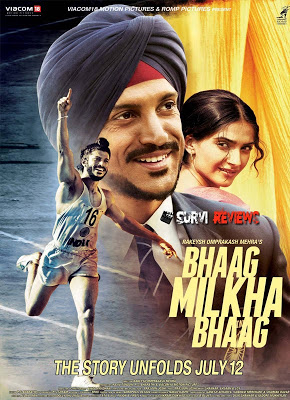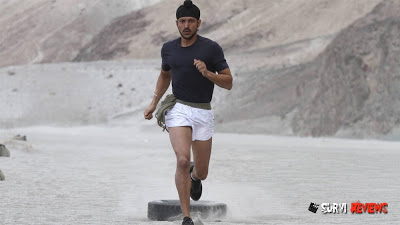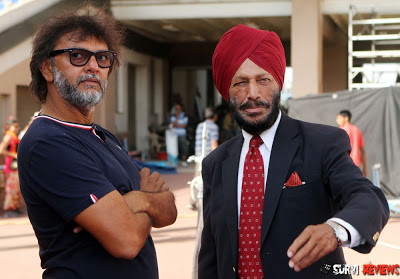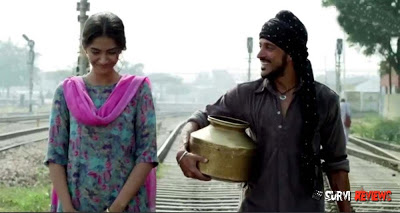Rakeysh Omprakash Mehra’s Bhaag Milkha Bhaag (2013) Movie Review
Starring: Farhan Akhtar, Sonam Kapoor, Rebecca Breeds, Divya Dutta, Prakash Raj, Pavan Malhotra
Written by Prasoon Joshi
Directed by Rakeysh Omprakash Mehra
Runtime: 189 Minutes
Watched at Tivoli 70mm, Secundrabad.
The STORY of INDIAN athletics starts with the name of MIKHA SINGH!!
Bhaag Milkha Bhaag is all about legendary ICON of INDIAN sports Milkha Singh, he arguably the greatest Track and Field athlete INDIA has ever produced.
The man, known to Indians of all generations as The Flying Sikh, was born in 1935 in Muzaffargarh, Pakistan. He used to walk barefoot 10 km from his village to a school in Kot Addu tehsil. He lost his parents, brother and sisters during Partition. After India and Pakistan came into being, Singh moved to Delhi to live with his sister. He was so fed up with life that he seriously thought about becoming a dacoit. But his brother convinced him to join the Army instead. He tried, but was rejected three times. He finally got in after he enrolled in the engineering department after his brother Malkhan Singh put in a word for him. He joined the EME Centre in Secunderabadin 1951. It was here that his talent as an athlete blossomed. His first competitive event was a cross-country race and he finished sixth among 500 runners.
It was between 1958 and 1960 that Milkha Singh saw the height of glory. From setting a new record in the 200 and 400 meters at the Cuttack National Games, he won two gold medals at the Asian Games at Tokyo. The lean Sikh went on to win gold at the Commonwealth Games in Cardiff, and was awarded the Helms trophy or being the best athlete in 1959. He was the first gold medalist from Independent India at the Commonwealth Games. But it was at the 1960 Rome Olympics that Singh entered his name in history books, despite missing out on a medal by a whisker.
Just before the Olympics, Singh had created a world record in a preliminary event when he finished the 400m race in 45.8 seconds. But when it came to the Olympics, Singh was extremely unlucky. He ran the 400 meters race and it was one of the closest races in Olympics history. The results were held up as the top four participants had finished the race at almost the same time. When the final ranks were announced, Singh had lost third place to Malcolm Spence from South Africa by the narrowest of margins, thus missing out on being the first Indian athlete to win an Olympic medal. He went through depression, and took a long time to recover from it.
Milkha Singh, First and only Indian who broke a track record in an Olympics and is also the first Indian to reach finals in Olympics.
Three years before the Indo-Pak war of 1965, Pakistan invited him to compete in Pakistan but, scarred by the trauma of Partition, Singh refused. It was only after then Prime Minister Jawaharlal Nehru convinced him to go that Singh went to Pakistan. One of the spectators who turned up to see Khaliq and Singh compete was General Ayub Khan. Singh won the race in front of 60 thousand audience, and when Khan was giving away the medals, he told Singh, “Milkha ji aaj tussi Pakisthan mein Daude nahi Tussi Pakisthan pe aake Udde ho!!” (You didn’t run today, you flew) “The Flying Singh” nickname caught on from then.
Milkha ran 80 races on the world circuit. All over Europe, Russia, Japan, all over and he won 77 Golds out of the 80. This is not just track record. This is an all-time record.
Bhaag Mikha Bhaag covers India’s most successful ever track athlete, who overcame childhood tragedy to seek Olympic glory.
Rakeysh Om Prakash Mehra, a director who motivated everyone with his film Rang De Basanthi. After seeing Rakeysh Om Prakash Mehra’s earlier works Jeev Mikha (Son of Milkha Singh) pressured his father to give to the script to Rakeysh and believing him Milkha Singh took just one rupee from Rakeysh Omprakash Mehra to allow him to make a film on his life.
The only one thing Milkha asked Mehra was, “Movie should be made in such a way that it inspires more youngsters to earn medals in athletics and perhaps inspiring them to fulfil that dream (before I die I want someone else to win that medal for India) for him.”
Rakeysh is nearly successful in his attempts to encourage future Indian athletes by showing just how close Flying Sikh came to Olympic glory, and perhaps inspiring them.
The way he titled the film shows his respect towards the man and determination to fulfill the promise. Bhaag Milkha Bhaag were the last words spoken to Singh by his father and the words that had saved his life from the carnage of Partition.
Bhaag Milkha Bhaag is a gripping experience which works majorly in its first halfwith a pinch of comic moments too, added brilliantly in its screenplay. The second half expectedly talks about the transformation part. However, putting all the pieces together, it’s a lot more than only an Athlete tale, taking you deep into the innocent world of Milkha Singh and the reasons for which he transforms himself are truly Inspirational.
The film’s cinematography by Binod Pradhan is spotlessly perfect, nurturing every nuance in the fine detail, from the locales to the expressions, it is fantastically done. The screenplay by Prasoon Joshi is fine. Shankar-Ehsaan-Loy’s music is urging and doesn’t intervene with the film’s flow. Zinda is one Inspirational song! The background score rather enhances the depth of the film.
Bhaag Milkha Bhaag had points in this film where I felt it could have been a major awards contender. The potential was there, but unfortunately, the execution of this storyabout Milkha has a few too many faults.
Even with a substantial running length of three hours and a bit, it feels like director Rakeysh is trying to tell more story than can be comfortably fitted into that body of time. The editing is rather hectic throughout, and the plotting feels rushed (especially in Second Half). It leaves Bhaag Milkha Bhaag with too many story and character contrivances. For example; the speed at which Farhan evolves from a disgruntled punk to a soldier is almost unrealistic. Even scenes like ending Sonam Kapoor’s character, Milkha’s transformation after 1956 Olympics (Scenes like taking notes from the athlete who won the race in 1956 were missing). At times directors find it too hard to edit their own well shot sequences, as a result they become too long unnecessarily. As a realistic biopic its fine but as an energetic bio-pic as projected it misses both the energy as well as the pace post interval.
Coming to Performances, It would have been a complete waste of talent if Farhan Akhtar would have continued with just directing films, his acting skills are much better than some overstated actors. Farhan Akhtar, playing the lead role of that daring Milkha Singh, the film simply becomes a rare treat to watch, particularly in its last 30 minutes. I think this is Farhan Akhtar’s best performance to date, he expertly immerses himself into Milkha, and he is so believable in this role, both emotionally, mentally and physically. Another noticeable merit of the movie is Sonam Kapoor who looks pretty in the role of Farhan’s love.
Sonam Kapoor accepted the role on one condition and her condition was that she would not get paid for it. She will not charge a single penny. And she didn’t, she just took 11 rupees (As it’s auspicious in India).
Yograj Singh is worth watching as as Milkha’s coach. Divya Dutta supported well as Milkha’s supportive sister. The scenes between them are truly touching. Prakash Raj and Pavan Malhotra are brilliant in their few scenes and equally good are all the other major actors in the supporting star-cast.
The moments where the film, literally, race up or are filled with adrenaline are the best moments you will find in the film. The National sections race is memorable. The first half races in the film are worth shouting, as a matter of fact every race in his film deserves your respect. All races were tense and exhilarating, just the way everyone likes it. The music is first class.
Well supported by a spectacular cinematography, striking music and an award winning performance by Farhan Akhtar, Bhaag Milkha Bhaag a film made with a noble intentions, and while it is usually engaging, it never feels deep enough to reach its full potential. On the whole, It’s a worth a watch film for striking a difficult balance between the life of a tragic childhood and a inspiring international athlete.
Survi Review: 3.25/5 (Rated 0.25 more for Farhan Akhtar)
Theatrical Trailer:




Recent Comments